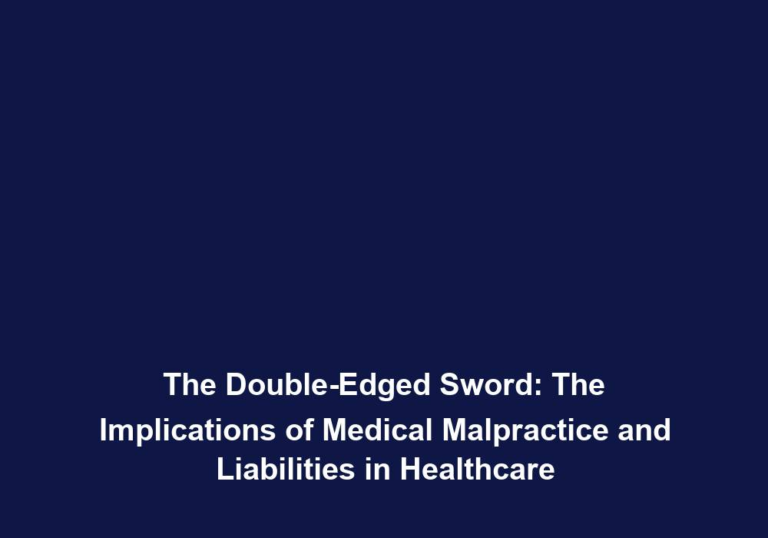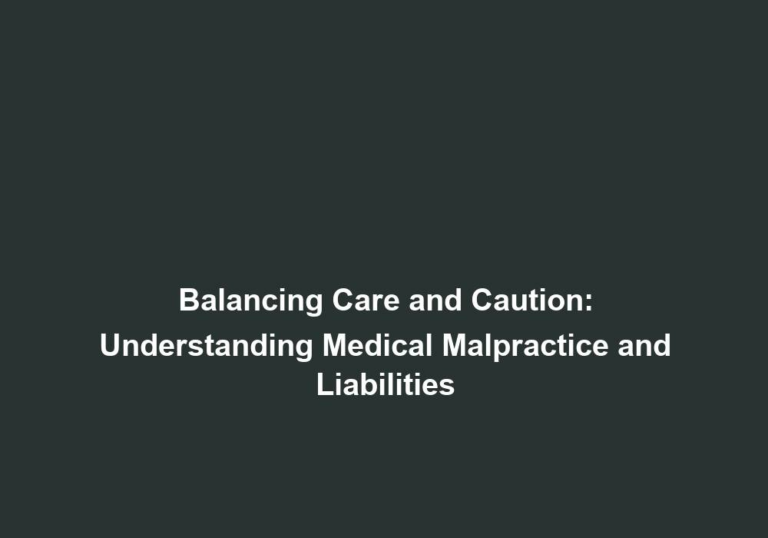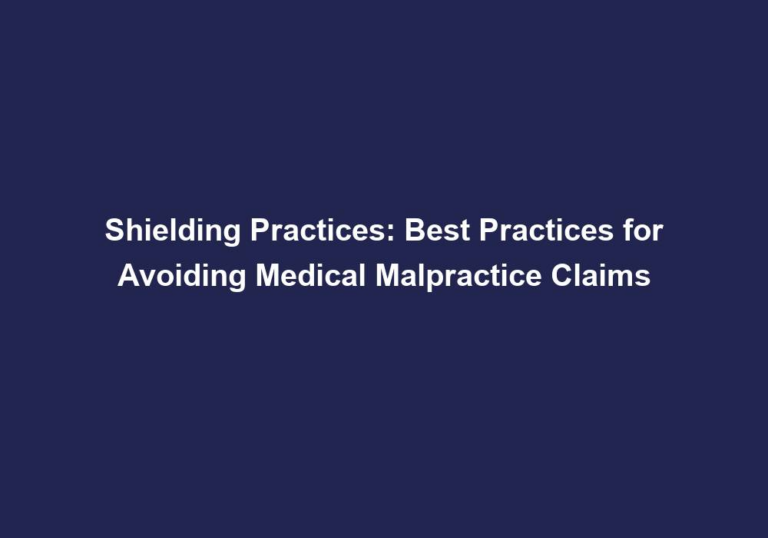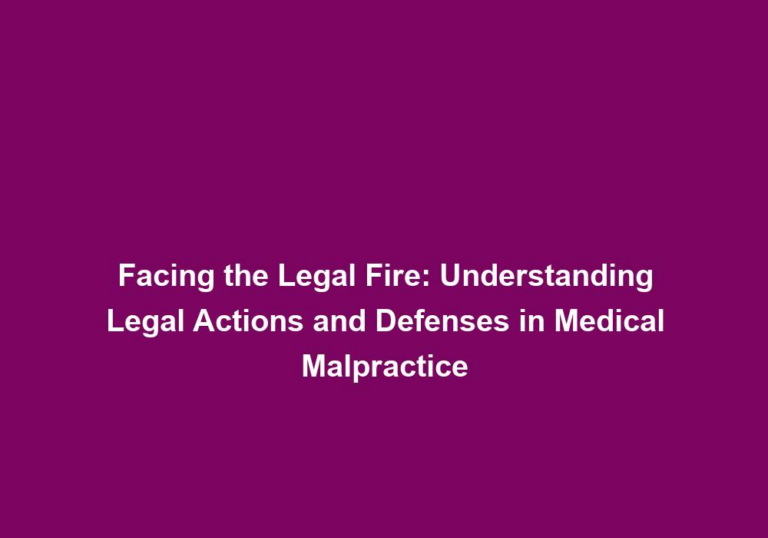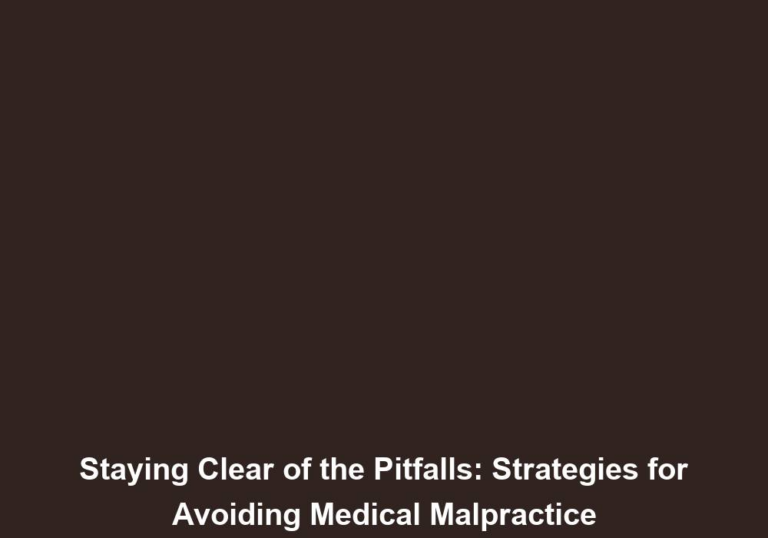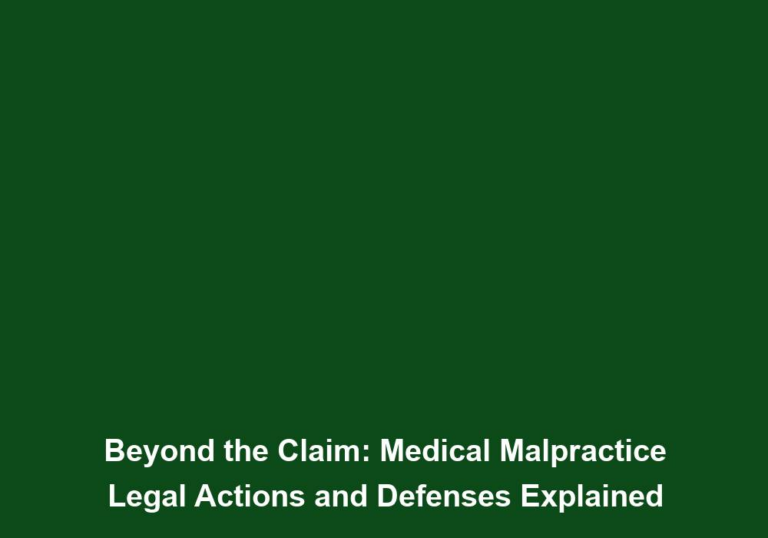In the Courtroom: How Medical Professionals Can Navigate Malpractice Claims and Defenses
Introduction
Malpractice claims can be a challenging and stressful experience for medical professionals. It is crucial for healthcare providers to understand the intricacies of navigating through a malpractice claim and effectively defending themselves in a courtroom. In this article, we will delve into the key strategies and defenses that medical professionals can employ to handle malpractice claims successfully.
Understanding Malpractice Claims
Before we dive into the strategies and defenses, let’s first establish a clear understanding of what a malpractice claim entails. Medical malpractice occurs when a healthcare professional, through a negligent act or omission, causes harm or injury to a patient. This harm can result from errors in diagnosis, treatment, aftercare, or even with failure to properly communicate with the patient.
To successfully defend against a malpractice claim, medical professionals must be aware of the common types of malpractice that can occur. These include misdiagnosis, surgical errors, medication errors, failure to monitor a patient’s condition, and failure to obtain informed consent. By understanding these potential areas of liability, medical professionals can take proactive measures to minimize the risk of malpractice claims.
The Importance of Documentation
One of the most critical aspects of defending against a malpractice claim is maintaining thorough and accurate documentation. Medical professionals must ensure that all patient records, test results, treatment plans, and communication with patients are properly documented. This documentation serves as crucial evidence in establishing the standard of care provided and can greatly influence the outcome of the case.
To effectively document patient care, medical professionals should include detailed notes about the patient’s medical history, symptoms, examinations, diagnoses, treatments, and any discussions or instructions provided to the patient. It is also important to include any follow-up actions taken and the patient’s response to treatment. Additionally, medical professionals should document any communication with other healthcare providers involved in the patient’s care.
Accurate and timely documentation not only provides a clear record of the care provided but also demonstrates the medical professional’s commitment to providing quality care. It can help refute claims of negligence and support the defense against a malpractice claim. Medical professionals should ensure that their documentation adheres to the guidelines and standards set by their respective medical boards or professional organizations.
Effective Communication
Clear and effective communication is key in avoiding malpractice claims. Medical professionals should maintain open lines of communication with their patients, ensuring that they understand the diagnosis, treatment options, potential risks, and expected outcomes. This communication should be documented in the patient’s medical records to demonstrate that the healthcare provider adequately informed the patient.
In addition to patient communication, medical professionals should also prioritize effective communication within their healthcare teams. Clear and accurate communication between healthcare providers helps to ensure that all team members are aware of the patient’s condition, treatment plan, and any relevant updates. This collaborative approach can help prevent errors and improve patient outcomes.
To enhance communication with patients, medical professionals can use various strategies, such as using plain language instead of medical jargon, actively listening to patients’ concerns, and addressing any questions or doubts they may have. It is also important to provide written materials or resources that explain the patient’s condition and treatment plan in a clear and understandable manner.
Early Case Evaluation
When faced with a malpractice claim, it is essential to conduct an early case evaluation. This evaluation involves a thorough analysis of the claim, gathering relevant evidence, and consulting with legal experts to determine the strengths and weaknesses of the case. Early case evaluation allows medical professionals to develop a strategic defense plan and explore possible settlement options.
During the early case evaluation, medical professionals should gather all relevant medical records, test results, and other supporting documents. They should also consult with legal experts who specialize in medical malpractice to gain insights into the specific legal requirements and potential defenses available.
By conducting an early case evaluation, medical professionals can assess the validity of the claim and determine the likelihood of success in defending against it. This evaluation helps in identifying any weaknesses in the defense and allows for the development of a stronger defense strategy. Early evaluation also provides an opportunity for medical professionals to consider alternative dispute resolution methods, such as mediation or arbitration, which can help avoid lengthy and costly court proceedings.
Expert Testimony
In malpractice cases, expert testimony plays a crucial role. Medical professionals should seek the assistance of medical experts who can provide their professional opinion on the standard of care provided. These experts can testify during the trial, explaining complex medical procedures, interpretations, and potential deviations from the standard of care. Their testimony can significantly influence the jury’s perception of the case.
When selecting expert witnesses, medical professionals should look for individuals with extensive experience and expertise in the relevant medical field. These experts should be able to provide clear and objective opinions based on the available evidence. It is important to establish a strong working relationship with the expert witness to ensure effective collaboration and preparation for trial.
Expert testimony can help medical professionals strengthen their defense by providing a credible and authoritative voice in support of their actions. The expert witness can explain medical concepts and procedures to the jury in a way that is easy to understand, helping to clarify any misconceptions or doubts. Their testimony can also help refute opposing expert opinions and establish the medical professional’s adherence to the standard of care.
Statute of Limitations
Understanding the statute of limitations is vital for medical professionals facing malpractice claims. Statute of limitations refers to the time frame within which a claim must be filed. It is crucial to consult with legal experts to determine the applicable statute of limitations in the jurisdiction where the claim is filed. Failure to meet the statute of limitations can result in the claim being dismissed.
Medical professionals should be aware that the statute of limitations for malpractice claims varies by jurisdiction and the type of claim. It is important to understand the specific deadlines and requirements set by the local laws and regulations. By staying informed about the statute of limitations, medical professionals can ensure timely responses to claims and avoid potential legal pitfalls.
To effectively manage the statute of limitations, medical professionals should implement systems and processes that track and monitor potential claims. This includes maintaining organized records, implementing reminder systems, and staying updated on changes in local laws or regulations. By proactively managing the statute of limitations, medical professionals can minimize the risk of claims being filed outside the allowable time frame.
Building a Strong Defense
Medical professionals must build a strong defense to counter malpractice claims. Some common defenses include:
- Lack of Negligence: This defense argues that the healthcare provider did not breach the standard of care, and the patient’s injury or harm was not a result of negligence.
To establish the lack of negligence defense, medical professionals should provide evidence that they followed accepted medical practices and protocols. This can include presenting expert testimony, medical guidelines, and documented procedures that support the standard of care provided.
- Contributory or Comparative Negligence: This defense asserts that the patient’s own actions or negligence contributed to their injury or harm.
To successfully use contributory or comparative negligence defense, medical professionals should demonstrate that the patient failed to follow recommended treatment plans, disregarded medical advice, or engaged in behavior that exacerbated their condition.
- Informed Consent: This defense states that the patient was adequately informed about the risks and potential complications associated with the treatment or procedure in question.
To support the informed consent defense, medical professionals should provide evidence of thorough discussions with the patient about the treatment, its potential risks, alternative options, and the patient’s consent documented in the medical records.
- Emergency Situations: This defense acknowledges that in certain emergency situations, medical professionals may not have enough time to follow standard procedures, and their actions should be evaluated under the circumstances.
To utilize the emergency situations defense, medical professionals should be able to demonstrate that they acted in accordance with the accepted practices and made decisions based on the available information and the urgency of the situation.
Building a strong defense requires careful analysis of the case, thorough preparation, and collaboration with legal experts. Medical professionals should proactively gather supporting evidence, identify potential weaknesses in the claim, and develop a robust defense strategy that aligns with the specific circumstances of the case.
Settlement Options
In some cases, it may be more advantageous for medical professionals to consider settlement options. Settling a malpractice claim can help minimize the financial and emotional burden associated with litigation. However, it is essential to carefully evaluate the terms of any settlement offer and consult with legal experts to ensure it is in the best interest of the medical professional.
When considering a settlement offer, medical professionals should assess the potential costs and benefits of proceeding with litigation versus accepting the settlement. Factors to consider include the strength of the defense, the potential damages sought by the claimant, the potential impact on reputation, and the anticipated time and resources required for litigation.
Legal experts can provide valuable guidance in assessing settlement offers and negotiating favorable terms. They can help medical professionals understand the potential risks and benefits associated with settlement and ensure that the terms of the settlement adequately protect their interests.
Conclusion
Navigating through a malpractice claim can be a complex process for medical professionals. By understanding the nuances of malpractice claims, maintaining thorough documentation, communicating effectively, conducting early case evaluations, seeking expert testimony, understanding the statute of limitations, building a strong defense, and considering settlement options, healthcare providers can better navigate these challenges. It is always recommended to consult with legal experts who specialize in medical malpractice to ensure the best possible outcome in a courtroom setting.


